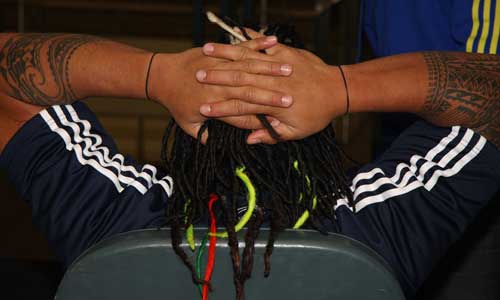Why shouldn't a white man wear dreadlocks when brands make big bucks out of 'cultural appropriation'?
We live in intolerant times, when what you wear in public can lead to uncomfortable consequences


Your support helps us to tell the story
From reproductive rights to climate change to Big Tech, The Independent is on the ground when the story is developing. Whether it's investigating the financials of Elon Musk's pro-Trump PAC or producing our latest documentary, 'The A Word', which shines a light on the American women fighting for reproductive rights, we know how important it is to parse out the facts from the messaging.
At such a critical moment in US history, we need reporters on the ground. Your donation allows us to keep sending journalists to speak to both sides of the story.
The Independent is trusted by Americans across the entire political spectrum. And unlike many other quality news outlets, we choose not to lock Americans out of our reporting and analysis with paywalls. We believe quality journalism should be available to everyone, paid for by those who can afford it.
Your support makes all the difference.Is there an uglier garment than the £49.50 Marks and Sparks swimsuit burkini? This voluminous garment might appear modest on dry land, but - as Nigella Lawson demonstrated a couple of years back by emerging from the Sydney surf in a full length black version, cleverly foiling the papparazzi - once wet, the swimsuit burkini can make the wearer resemble a badly stuffed sausage.
Like other crimes against fashion - the poncho, mid-calf length culottes, stretch denim jeans and prissy pie crust frilled blouses - the burkini bathing costume offers nothing except acres of coverage.
It’s hardly a compliment-magnet, far from it, but there’s a good reason why high profile international designers like Dolce and Gabbana are offering shapeless clothing which covers the flesh in costly fabrics (they’ve launched a range of Muslim robes and veils) and why Marks & Spencer, alongside their latest trendy Alexa Chung range, are making burkinis: it’s cash, nothing more or less.
The international Muslim clothing market is said to be worth billions annually and you only have to step inside the M&S flagship store at Marble Arch in London to see queues of burkha-wearing customers spending thousands of pounds every five minutes.
In France, the trend to exploit this market is seen as unpatriotic and has attracted much hostile comment. The Minister for Families has claimed that fans of the burkini and designers who pander to it are "like negroes who support slavery", adding "when brands invest in this Islamic garment market they are shirking their responsibilites….promoting women’s bodies being locked up". Fighting talk - and Pierre Berge, who as Yves St Laurent’s business partner built a global empire, was equally dismissive, announcing "we must teach Muslim women to revolt, to take their clothes off, to learn to live like most of the women in the rest of the world".
The French government has passed laws protecting their secular state by banning the headscarf in schools (and other clothing which denotes religious affiliations) and the wearing of the full veil, the niqab, in public. Both decisions have been upheld by EU courts, although there are few prosecutions. In a recent poll, more than 85 per cent of the public supported the laws.
Nevertheless, the number of women wearing the veil in France and in the UK grows every year. For many, it is not merely an expression of their religion (though the Quran simply advocates that women dress modestly) but their right as feminists to wear whatever they want. Reluctantly, I have to accept this, although I find the sight of women enveloped in the shapeless black garment deeply depressing.
Wearing modest clothes or a burkha doesn’t signal you are devout, or a feminist. You could just as easily be wearing the headscarf or the burkha because of social or family pressure. Some young women will have no choice. Many Muslim women abhor the wearing of the veil, and the inference that women who wear more revealing clothes are somehow more promiscuous or less spiritual.
But the intemperate language of Monsieur Berge and the French Minister is yet another sign that we live in intolerant times, when the simple matter of what you wear in public can have unpleasant and threatening connotations.
In the USA, a black female student at San Francisco State University has just denounced a white male student for having the temerity to wear dreadlocks, because they "belonged" to her culture, presumably because the hairstyle is associated with Jamaican Rastas and their fight for freedom. The dreadlocked boy claimed they originated in Egypt, but that cut no ice with his accuser.
Can a hairstyle be the exclusive property of one particular ethnic group? How many of us have boarded flights home from holidays in the sun and seen small girls with their hair braided in corn rows? Presumably, this zealot would have berated them for appropriating a black tradition. Last Christmas in Australia, every farmer’s market I visited in Northern New South Wales was run by shoeless white men and women sporting dreadlocks, the 30-something children of the original sixties dropouts, now earning a living as farmers selling their home-grown organic vegetables and designer coffee.
As for pandering to women who cover themselves, Dolce and Gabbana have form when it comes to faith - they stuck the Virgin Mary on t-shirts which sold for almost £300 a pop. Like all designers and pop stars, they will plunder anything for good source material if it sells.
Ironically, it was Yves St Laurent who put women in trouser suits, which covered a great deal more flesh than the mini skirts which had preceded them. And if he was still alive, rich Muslims would be his best customers.
Join our commenting forum
Join thought-provoking conversations, follow other Independent readers and see their replies
Comments